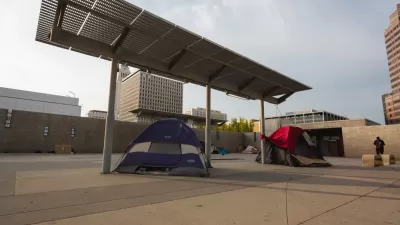Heat-related deaths are rising, and higher temperatures are just one reason.

Public health officials are warning that a spike in heat-related deaths is attributable to not just hotter weather but also “an increase in drug use and homelessness,” according to an article by Phillip Reese in Governing.
“Heat was the underlying or contributing cause of about 1,670 deaths nationwide in 2022, for a rate of about 5 deaths per million residents, according to provisional data from the CDC. That’s the highest heat-related death rate in at least two decades,” Reese explains.
While record temperatures are partly to blame, other factors contribute to the higher rate of deaths. “Substance abuse, especially misuse of methamphetamines, has emerged as a major factor in heat-related illness. Methamphetamines can cause body temperature to increase to dangerous levels, and the combination of meth abuse, heat, and homelessness can be fatal.” With more people facing unsheltered homelessness and housing insecurity, the combination is deadly. “Homeless people represented about 13 percent of California hospitalizations involving a primary diagnosis of heat-related illness from 2017 through 2021, state data shows.”
Another factor: age. “The numbers of elderly residents in California and across America have risen sharply as baby boomers have aged,” and so has their vulnerability to heat-related illnesses. “Advocates and experts called for more cooling centers, more affordable housing, and better workplace safety rules to help get vulnerable populations out of the rising heat.”
FULL STORY: Heat-Related Deaths Are Up. It’s Not Just from the Weather

Planetizen Federal Action Tracker
A weekly monitor of how Trump’s orders and actions are impacting planners and planning in America.

Chicago’s Ghost Rails
Just beneath the surface of the modern city lie the remnants of its expansive early 20th-century streetcar system.

San Antonio and Austin are Fusing Into one Massive Megaregion
The region spanning the two central Texas cities is growing fast, posing challenges for local infrastructure and water supplies.

Since Zion's Shuttles Went Electric “The Smog is Gone”
Visitors to Zion National Park can enjoy the canyon via the nation’s first fully electric park shuttle system.

Trump Distributing DOT Safety Funds at 1/10 Rate of Biden
Funds for Safe Streets and other transportation safety and equity programs are being held up by administrative reviews and conflicts with the Trump administration’s priorities.

German Cities Subsidize Taxis for Women Amid Wave of Violence
Free or low-cost taxi rides can help women navigate cities more safely, but critics say the programs don't address the root causes of violence against women.
Urban Design for Planners 1: Software Tools
This six-course series explores essential urban design concepts using open source software and equips planners with the tools they need to participate fully in the urban design process.
Planning for Universal Design
Learn the tools for implementing Universal Design in planning regulations.
planning NEXT
Appalachian Highlands Housing Partners
Mpact (founded as Rail~Volution)
City of Camden Redevelopment Agency
City of Astoria
City of Portland
City of Laramie





























